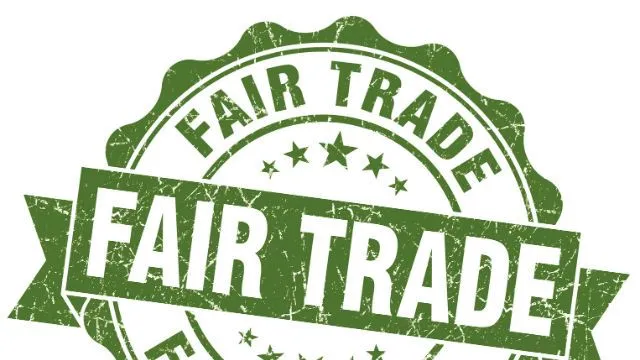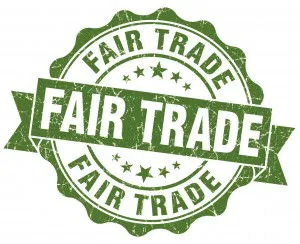
- Share on Facebook72
- Share on Pinterest
- Share on Twitter
Many Americans aren’t aware of the Fair Trade symbol, or understand what it means. A Fair Trade label indicates that farmers have been paid a fair price for their harvest, and that workers who were involved labored in safe conditions.
It also means that working families were able to keep their kids in school and that the money earned was cycled back into the local economy where those workers live.
The label also means that an organization like Fair Trade USA has certified that the farmers and other producers have adhered to fair trade standards. An audit is conducted of the product’s supply chain by the organization, ensuring fair trade prices have been paid.
When you buy a Fair Trade product, you’re helping to dramatically improve the quality of life for farmers in 58 developing countries across Africa, Asia and Latin America. Your purchase helps to bring families out of poverty and give children food, shelter and education necessary to thrive.
All you need to do is look for that Fair Trade symbol. If you aren’t sure where to start, here is a look at five of the most common, and most important, Fair Trade foods.
Cocoa or chocolate
Cocoa farmers are often forced to sell their harvest to unscrupulous middlemen who can’t be trusted to measure quantities accurately or to pay full price. Child slaves are even sometimes used to grow and harvest the cocoa beans – in Côte d’Ivoire and Ghana, children are often kidnapped from neighboring Mali and Burkina Faso in order to provide slave labor on cocoa plantations.
Fair Trade certification ensures that farmers not only receive a fair price, it also allows the farmers to invest in techniques that bring out the flavors of the region while strictly prohibiting slave and child labor.
Coffee
The majority of coffee farmers, particularly small-scale operations, live in remote locations and are often forced to sell their crops to middleman at a much lower price than what they would get if they sold it themselves. Buying Fair Trade coffee helps to ensure that farmers build relationships with more reputable business partners, and are paid a fair price for their crop.
Plus, Fair Trade, organic coffee tastes better and it’s better for your health. As the demand for global coffee increases, methods of mass-producing it often leads to lower-quality produce. Sustainably grown organic coffee is typically grown slower, and under rainforest canopy. It is also grown without chemical fertilizers and pesticides, allowing the coffee to keep all of its nutrients.
Tea
Tea is one of the most popular beverages in the world, ranking second only to water. As a tea crop is often grown on large plantations where workers are paid very little to pick and process tea leaves, buying tea with the Fair Trade label is a great way to help change this.
Bananas
With nearly 100 million metric tons of bananas consumed every year, it’s one of the world’s most important food staples, generating billions of dollars. Only five corporations control about 80 percent of sales on the banana import market worldwide, but it’s hard for the small banana farmer and workers on plantations to earn a living – and many work and live in difficult conditions. Buying Fair Trade bananas can help to increase their salaries and ultimately even change working conditions.
Honey
Without Fair Trade support, the beekeeping families living in Asia and Latin America have to depend on middlemen to purchase their honey, and as with many other products, often at just a fraction of its worth.
 Purchasing Fair Trade honey guarantees those producers a set minimum price for their honey, as well as linking cooperatives directly to the US market to help pave the way for long-term sustainability.
Purchasing Fair Trade honey guarantees those producers a set minimum price for their honey, as well as linking cooperatives directly to the US market to help pave the way for long-term sustainability.
-The Alternative Daily
Sources:
http://www.fairtrade.net/bananas.html
http://www.care2.com/greenliving/11-foods-you-didnt-know-you-could-buy-fair-trade.html
http://www.care2.com/greenliving/why-you-should-only-buy-fair-trade-chocolate-on-valentines-day.html
http://www.globalhealingcenter.com/natural-health/fair-trade-coffee
- Share on Facebook72
- Share on Pinterest
- Share on Twitter

